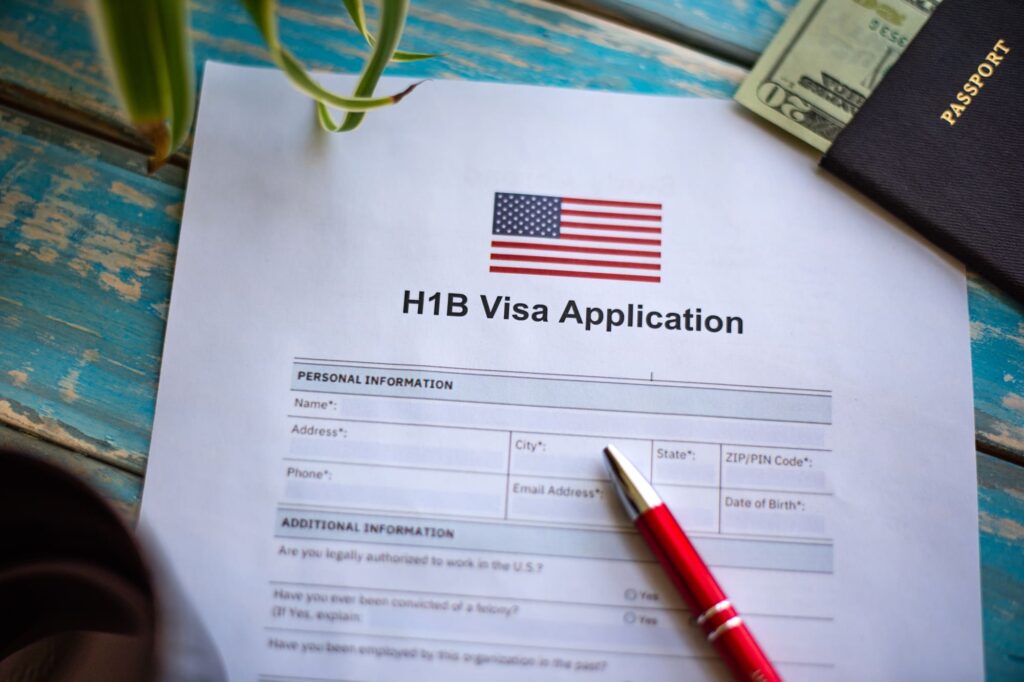The H-1B is a nonimmigrant visa that allows U.S. employers to hire foreign workers in “specialty occupations.” Typically, this means the job requires a bachelor’s degree or higher in a specific field, such as technology, engineering, finance, or law, and the employee has a degree in that same specialty.
Attorney Tip: Using Experience in Place of a Degree
If you have substantial training and progressively responsible work experience, this can sometimes count as the equivalent of a U.S. degree for H-1B purposes. An immigration attorney can help evaluate how your background stacks up under USCIS criteria.
Your First H-1B: The “Cap” Process
The H-1B visa is employer-sponsored, so the first step is finding a U.S. employer willing to submit a petition on your behalf. However, there’s a limit—or “Cap”—on the number of new H-1Bs available each year. When demand exceeds supply, USCIS uses a lottery system to randomly select who can move forward.
Did You Know? H-1B Cap Exemptions Explained
Applicants with a U.S. master’s degree or higher get a second chance in a separate lottery, improving their odds. Additionally, some nonprofit, academic, or research employers are cap-exempt, meaning they can petition outside of the cap entirely. Some individuals may also qualify for cap exemptions depending on their role or employer.
H-1B status is typically granted for up to 3 years, and can be extended for a total of 6 years without going through the cap again—as long as you’re staying in the same status.
Expert Insight: Extending H-1B Beyond 6 Years
If you’ve reached certain milestones in the green card process, such as an approved Form I-140, you may be eligible for extensions beyond 6 years. Otherwise, after hitting the 6-year limit, you must leave the U.S. for 12 months and re-enter the lottery. A well-timed green card strategy can help avoid this scenario.
Leaving an H-1B Job & Finding a New Employer
As you may already know, the H-1B visa is closely tied to your employment. So what happens if you find a better opportunity and want to leave your current job, or if your employer can no longer keep you on? You typically have a 60-day grace period to change jobs, adjust your status, or leave the country. The new employer must file a “change of employer” H-1B petition before you can start working.
Pro Tip for H-1B Holders Switching Jobs
You’re allowed to begin working for the new employer as soon as the petition is filed, but this comes with risk if the petition is later denied. Premium processing (with an extra fee) can deliver a decision within 15 days. Transferring between employers may seem simple, but legal pitfalls make it smart to consult an attorney.
Options for Your Family
If you’re married or have children, they may qualify for H-4 visas. These allow your spouse and any unmarried children under 21 to live in the U.S. with you.
Immigration Attorney’s Note: Can Your Spouse Work?
Once your I-140 petition is approved and you’re waiting for a green card, your spouse may apply for an H-4 EAD (Employment Authorization Document). This is a valuable option that allows them to legally work while your permanent residency is in process.
From H-1B to Green Card
The H-1B is a dual-intent visa, meaning you’re allowed to pursue permanent residency (a green card) without risking your nonimmigrant status. The most common path is through your employer and includes:
- PERM labor certification
- I-140 immigrant petition
- Adjustment of Status (I-485)
However, because green card availability depends on your country of origin, some applicants face long wait times. Fortunately, H-1B status can be extended indefinitely while waiting in line.
Legal Strategy Note: Choosing the Right Green Card Path
The best route depends on your background and the job offer. While many H-1B holders go through the EB-2 or EB-3 categories, others may qualify for EB-1, family-based, or even lottery-based green cards. Each option has pros and cons, and timing is everything, so legal strategy matters.
Disclaimer
This article is for informational purposes only and does not constitute legal advice. Laws and policies are subject to change, and individual cases may vary. Consult with Lefebvre Michel, PLLC, to discuss your specific situation and receive personalized guidance.

